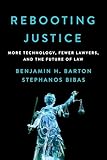Rebooting justice : More technology, fewer lawyers, and the future of law / Benjamin H. Barton & Stephanos Bibas.
Publisher: New York, New York : Encounter Books, [2017]Description: 231 pages ; 24 cmContent type:- text
- unmediated
- volume
- 9781594039331 (hardback)
- 347.73 BAR 23
- KF384 .B374 2017
- LAW025000 | LAW026000 | LAW011000 | LAW062000
| Item type | Current library | Call number | Status | Date due | Barcode |
|---|---|---|---|---|---|
 BOOKs
BOOKs
|
National Law School | 347.73 BAR (Browse shelf(Opens below)) | Available | 37427 |
Includes bibliographical references (pages 205-221) and index.
Includes bibliographical references and index.
Introduction -- The reality of criminal justice for poor defendants -- How we got here : criminal defense -- Access to justice in civil courts -- How we got here : civil law -- The political economy of Gideon and civil Gideon -- Against "More Lawyers, More Justice" -- Techno-optimism and access to justice -- Court reform -- Cheaper lawyers and paraprofessionals -- Criminal case triage -- Conclusion : fewer lawyers, more justice.
"America is a nation founded on justice and the rule of law. But our laws are too complex, and legal advice too expensive, for poor and even middle-class Americans to get help and vindicate their rights. Criminal defendants facing jail time may receive an appointed lawyer who is juggling hundreds of cases and immediately urges them to plead guilty. Civil litigants are even worse off; usually, they get no help at all navigating the maze of technical procedures and rules. The same is true of those seeking legal advice, like planning a will or negotiating an employment contract. Rebooting Justice presents a novel response to longstanding problems. The answer is to use technology and procedural innovation to simplify and change the process itself. In the civil and criminal courts where ordinary Americans appear the most, we should streamline complex procedures and assume that parties will not have a lawyer, rather than the other way around. We need a cheaper, simpler, faster justice system to control costs. We cannot untie the Gordian knot by adding more strands of rope; we need to cut it, to simplify it"-- Provided by publisher.

There are no comments on this title.